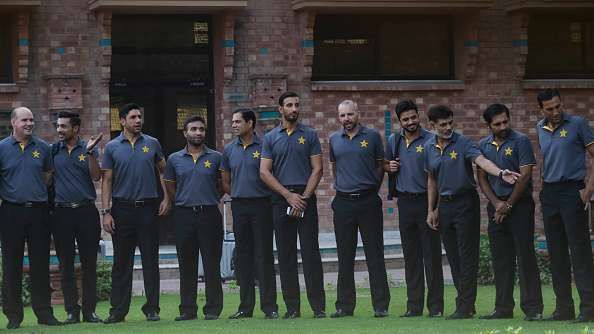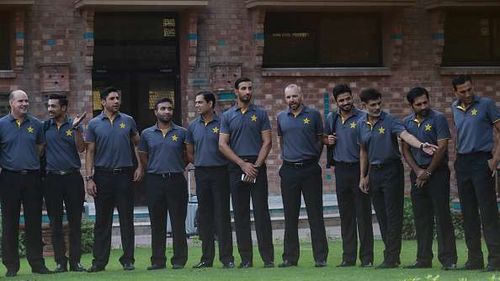
How things have changed since Amir and Pakistan's last tour to England
5 years, 10 months and 15 days – that’s how long it has been since Pakistan played a test match cricket at Lord’s, and that’s the same time period that has elapsed since the Pakistan Cricket Team played their last Test match in England. On the morning of August 29th, 2010, a long-faced Mohammad Amir, in the iconic Lord’s Long Room, was presented with the Man of the Series trophy, shortly before being taken into custody for spot-fixing along with teammates Mohammad Asif and Salman Butt.
The captain of Pakistan Cricket Team, their lead fast bowler, and a fast bowling sensation who was taking the world by storm, all of them, the best from the Pakistani pack which played in England, were daubed with the dirt of spot-fixing. The mass media, the newspapers, the internet, everyone had a say and not for the first time, cricket – the gentlemen’s game – was being frisked by the authorities and the well-tapered trousers of the game now had patches of greasy stains. For nights to come, cricket would spend sleepless nights…the clouds were heavy with barely a silver lining.
Also read: Inzamam-ul-Haq upset with Alastair Cook's comment on Mohammad Amir
Fresh beginnings after a tainted past
July 2016: An overhauled Pakistani team has landed in England, the world has changed, cricket has changed, the bails now light up after being dislodged, there is some talk about the other half of the stump now included within the purview of umpire’s call, the World Champion in the 50 over format has changed twice (since Pakistan last toured England) and thrice in the T20 format.
But, when Pakistan get down from those iconic stairs into the long room and make their way onto the playing area of the Mecca of Cricket – Lord’s – nothing will have changed for them. That gloomy morning will still linger with them, those eyes, those front page reports headlined ‘CAUGHT,’ may come back to haunt them. Pakistan need to understand and imbibe what Enzo Ferrari once said, “What is behind you, doesn't matter.” Easier said than done Mr. Ferrari, would be a prompt reply from Pakistan, but they will know, that it is the only way out.
Just like every other piece about this series, this one will also talk more about Pakistan than about England, and that is purely because, frankly, England are playing their best cricket at the moment, they have pretty settled units across formats and are in that phase of their cricket where the average kid starts studying harder to be a part of the above-average category.
But, England would know, that this Pakistani side will have more points to prove than England have ever had to, and apparently, Pakistan play their best cricket when their backs are against the wall. This time around they not only have their backs against the wall but their throat asphyxiated and head bruised, the only way Pakistan go from here is, up.
Also read: England vs Pakistan 2016: Why this is Pakistan's best chance to win a Test series outside Asia for a while
A tough challenge lies ahead
But, to come out swinging, Pakistan will not only have to play the best cricket that they’ve played in quite some time, but will also have to ensure that peripherals don’t affect them, because the English audience is bound to have felt cheated back in 2010, and to play in front of them will be as embarrassing as it is for a truant to attend school the day after his trick became an open secret.
Pakistan can’t be the same complacent side that accepts defeat when the situation demands that extra edge from them as a unit, and why I say this, is because, unlike other sides, that have changed the way they play their cricket over the past few years (the biggest example of which is Bangladesh and their belief that they can win) in a bid to stay abreast with the changing times, Pakistan still seem to stutter when the situation demands that extra 10% from them, and more than anyone else, every member of that team would know the importance of reversing that notion.
Pakistan have had stability issues as late as post the WT20 2016 when Waqar Younus was unhappy with his team’s performance and Shahid Afridi stepped down as captain (again!). They can’t be a group of 11 individuals, because unlike in the parts of the world Pakistan have played their cricket hitherto, the spectators in England are hurt, and when they come out hurling criticisms, schisms within the team will only act as a lousy dessert after an unfulfilling cold meal. Pakistan would strive for warmth when the cold English fans chide them. The jumpers won’t help them stay warm, neither would the beanies, and far away from home, amid people who don’t really like you, the only source of warmth is your team, the 20 people who believe that if Pakistan can play like a team, shoulder-to-shoulder, a victory will seem more palpable and team sprit – a virtue to reckon with.
Amir’s second chance
“Mereko ‘Bhola' bolta tha Salman (Butt), maine bade bhai jaisa maana usko…mai apne aap ko andar se maar raha tha, maine apne mulk, ko apne allah ko cheat kia,“ a long-haired, slender young Mohammad Amir could barely speak when he talked to Mike Atherton in an interview for Sky Sports. For a man who had nothing in a small village on the outskirts of Rawalpindi, but a desire to run-in bowl fast and win his country games, to play at Lord’s was beyond a dream come true. It was a miracle that not many from our parts of the world are entitled to.
But one act of stupidity, one moment of naivety, lack of a second of courage, and Mohammad Amir went straight from being the prodigal protagonist of a success-story to a criminal and a perpetrator. Imagine the plight of an 18-year-old kid (yes, a kid) who had seen the high of success hours before being handcuffed. The same wrists which produced some of the most breathtaking swing bowling of 21st century were now chained. “Maine apne aap ko bola, ki ab kabhi cricket ke baare mei sochunga bhi nahi,“ the game had almost lost out on one of the finest talents it ever witnessed.
On July 14, 2016, when Mohammad Amir walks out on the lush green turf of the iconic Lord’s with his team, life will come a full circle for him. Sure the world has changed, cricket has changed, perspectives about Amir’s return have changed too (from negative to positive), but for Amir – now a short-haired soft-spoken lad – the calendar will still say August 29th, 2010.
2416 days after playing his last test match, time will start again for Amir and in a way for Pakistan too. It’s their second chance. Not everyone gets one.
